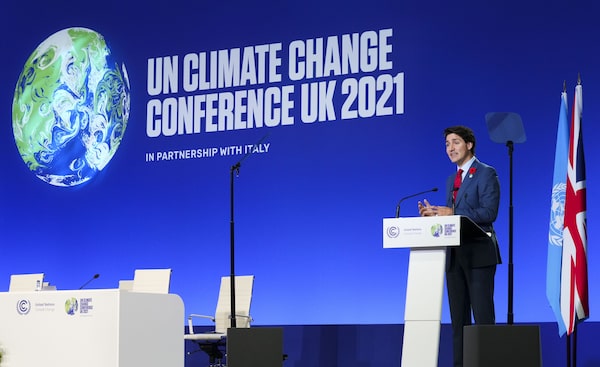
Prime Minister Justin Trudeau delivers a short speech at the 26th meeting of the Council of Parties to the UN climate convention, known as COP26, in Glasgow, Scotland, on Nov. 1, 2021.Sean Kilpatrick/The Canadian Press
Elliott Cappell is PwC Canada’s national climate change leader, and Toronto’s former chief resilience officer.
As the United Nations’ multilateral summit COP26 came to a close in Glasgow, the Canadian delegation returned home having committed us to a number of worthwhile causes, from halting deforestation to ending overseas coal financing. But we are still on pace to fall well short of our headline emissions-reduction commitments. Canada has committed to reducing emissions by 40 to 45 per cent from 2005 levels by 2030, but at our current pace we will achieve only a 16-per-cent reduction by then.
Amid all this, it’s hard to ignore the naysayers of such events. We shouldn’t be spending the money – not to mention the carbon – needed to show up to these global events, they argue, especially if they only produce “business as usual and blah blah blah,” as youth activist Greta Thunberg put it.
I agree. Canada should not travel to the next major conference – COP31, likely to be held in 2026. Rather, we should host.
It is worth remembering why the world bothered with COP in the first place: It’s a global effort to collectively tackle the reality that climate change is a serious threat to humanity’s survival on Earth. If the “why” of such high-profile gatherings is to minimize the physical consequences of climate change, then the “how” is by bringing an end to burning fossil fuels, which represents the main cause of anthropogenic climate change and leads to between two-thirds and three-quarters of global greenhouse gas emissions.
And in this central regard, COP26 marked an important change. While the final text was somewhat watered down, 197 countries explicitly targeted fossil fuels, with pledges to enact, for example, “phase-out of inefficient fossil fuel subsidies.” And when we look back in history, COP26 will be seen as the turning point toward the end of coal.
The end of fossil fuels, however, will have enormous implications in Canada. A recent report from the Canadian Institute on Climate Choices estimates that 9 per cent of Alberta’s jobs are at risk from the transition to a low-carbon economy. Bay Street could be deeply disrupted if flows of capital were to seek out greener investments, as the TSX scores the worst among G7 stock exchanges on decarbonization, according to the Science Based Targets initiative. And rural communities such as Tillsonburg and Ingersoll in Ontario, Wood Buffalo in Alberta and Thompson in Manitoba have economies and job markets that are heavily reliant on industries that would suffer in a transition to a low-carbon economy. Figuring out the transition to a low-carbon economy should be a top item on our national economic agenda.
If Canada were to host COP31, we would again be at the centre of those global decarbonization decisions, as we were when Canada hosted COP11 in Montreal in 2005, and the 1988 Toronto Conference (which predated the current COP process). The Toronto Conference in particular is credited as a pivotal event in advancing the international scientific consensus on climate change, and Canadians were centre stage: Then-prime minister Brian Mulroney gave the opening address, while Canadian Stephen Lewis chaired the conference.
COP26 did also manage to move a lot of money around. From carbon pricing to green finance to sustainable investment standards, hundreds of trillions of dollars moved away from fossil fuels and toward low-carbon products. In the final tally, COP26 was as much about the dollars as the emissions.
Hosting would position Canada to capture more than our fair share of that global market for low-carbon goods, services and ideas. COP31 would offer a showcase for Canadian ingenuity in electric vehicles, renewables, nuclear, hydrogen and other green or low-carbon opportunities that would be used to smooth the necessary transition.
The United Kingdom took that approach at Glasgow’s COP26. On the eve of the summit, Boris Johnson’s government laid out a Net Zero Strategy to capture £90-billion of private investment and grow the economy by 440,000 jobs, leveraging the event to showcase the U.K.’s green industry and other climate credentials. We could do the same, or perhaps better.
Indeed, if there is one certainty with regards to Canadians and climate change, it is that we do need to do better. The honest truth is that we are climate laggards, with the highest emissions growth of any G7 country since the Paris Agreement was first signed in 2015.
So that might well prove to be the biggest benefit to hosting COP31: It would force us to demonstrate real progress on climate action, before the world’s spotlight shines on us.
Keep your Opinions sharp and informed. Get the Opinion newsletter. Sign up today.